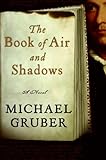 Michael Gruber’s novel The Book of Air and Shadows is the story of a lost Shakespeare manuscript and how it is found. An aspiring filmmaker, Albert Crosetti, finds an ancient letter hidden in the binding of an old set of books that were damaged in a fire at the rare books shop where he works. The letter alludes to ciphers, which once decoded, will point toward a lost play written by William Shakespeare about Mary, Queen of Scots.
Michael Gruber’s novel The Book of Air and Shadows is the story of a lost Shakespeare manuscript and how it is found. An aspiring filmmaker, Albert Crosetti, finds an ancient letter hidden in the binding of an old set of books that were damaged in a fire at the rare books shop where he works. The letter alludes to ciphers, which once decoded, will point toward a lost play written by William Shakespeare about Mary, Queen of Scots.
Certainly much of Gruber’s scenario seems believable. Conflict between Protestants and Catholics in England during the reign of James I certainly could have given rise to a plot to convince secret papist William Shakespeare to write a play concerning a controversial subject, but Shakespeare was a smart man who knew his audience. As great as his take on Mary, Queen of Scots might have been, he never would have dared to write it with Mary’s son on the throne. Certainly there are lost plays. Scholars agree , for example, that he wrote a play called Love’s Labours Won that has been lost to the ages, and perhaps The History of Cardenio (co-written with John Fletcher). But I have problems with the notion that Shakespeare could ever have been induced to write about Mary, Queen of Scots in a fairly good light (and, obliquely, about Queen Elizabeth I in a bad light).
Another problem the plot hinges upon is the dearth of evidence about William Shakespeare’s life. Supposedly, this lack of evidence makes Richard Bracegirdle’s accounts of Shakespeare valuable in their own right, even without locating the lost play. Well, we don’t know a lot about Shakespeare’s life, but we know about as much about it as we do about other writers of his era. Look at it from a genealogist’s standpoint, and it becomes clear we have quite a lot of information about him. I can’t even figure out who my paternal grandmother’s father was, but we know the name of both of Shakespeare’s parents, his siblings, his children and grandchild, and his wife’s maiden name. A lot of folks would give their eyeteeth to know that much information about a sixteenth-century ancestor. And that’s just a little bit of what we know about Shakespeare. The argument Gruber makes through his characters that we know substantially less about Shakespeare than we should doesn’t wash for me.
Aside from that, I really disliked the story. The characters, with the exception of a few minor players, had few redeeming qualities or likable traits. It’s a novice writer who tries to make his characters too perfect. As readers, we want to be able to relate on a human level to characters, and perfection prevents us from doing so; however, I think we also want to like something about the characters, or we don’t care. The bottom line is that I didn’t care a whit what happened to any of the major players because I didn’t like any of them. Gruber goes too far in making his characters realistic. He emphasizes only their negative traits so that when it comes time to redeem them, I don’t buy it and I don’t care. In addition, much of the plot’s forward motion is stopped by Gruber’s characterization. Complain about Dan Brown’s wooden characters you should, but at least he moves the plot forward and doesn’t allow characterization to get in the way of telling the story. I love character-driven books, but I have to find something to like about the characters.
I like the premise of the book, and my favorite parts were the Bracegirdle letters in which the times and intrigues of early seventeenth-century England were revealed. Even these were somewhat problematic for me, as Bracegirdle’s writing didn’t sound period. It sounded like modern writing spelled funny. Compared to Anthony Burgess’s well-written and very period Nothing Like the Sun, the letters sounded, well, fake.
Overall, obviously, I can’t recommend this book. Dogged determination to find something in it to like forced me through it, I guess, but in the end, I wish I’d never picked it up. I love the feeling of putting down a good book. I don’t want to leave it, and the characters are people who feel like friends. I just feel kind of dirty and thankful it’s over after putting this book down. Steve tried to warn me about this, but the book has a pretty cover, and for once, the old adage should have been taken seriously. It has been my experience up until now that most of the time, pretty covers have good stories inside them, too.
If I may be allowed one more minute to beat this dead horse, I have to add that I can’t figure out why a good literary thriller can’t be written. I’ve been disappointed in each one of them I’ve read in some way or another: The Da Vinci Code, The Geographer’s Library, Codex, and The Rule of Four all had some problem or other that prevented them from being a satisfying read. Wait. I take that back. I’ve read one that was really good: Matthew Pearl’s novel The Dante Club. Since Pearl has proven it can be done, one wonders vaguely why it isn’t done more often.
With my next book, I return to the Historical Fiction Challenge with Jean Rhys’s novel Wide Sargasso Sea.
